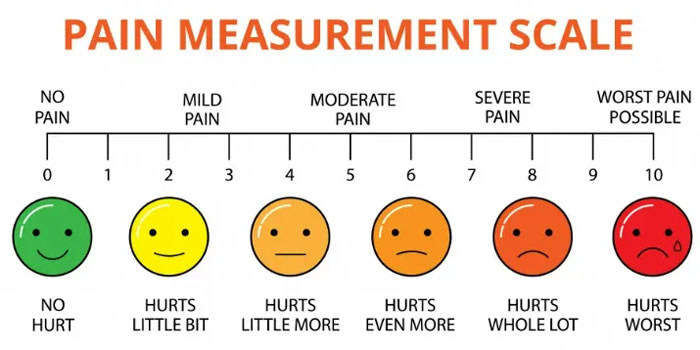When the personnel is unconscious, do people feel pain anymore?
Scientific data suggest that it is likely that people with minimal states of consciousness, such as when unconscious, still experience pain if they are experiencing some sort of trauma.
One of the reasons why pain is so difficult to study is that our subjective experience of pain sensations and physical manifestations of pain are so different, since each person has different organs for communication. perceive pain and the brain perceives pain.
Animals in general also have pain receptors, but it is not known whether animals 'feel' pain in the same way as humans? It is also interesting that consciousness as well as self-awareness are considered important criteria for an organism to "feel" pain. That's why psychologists say that babies can't feel pain for a very long time.
Often we can only tell if someone is in pain and to what extent if we ask them. So what happens when you lose consciousness?
How does science explain it?
One way to investigate this idea is to ask caregivers or people who are in regular contact with people who are unconscious. In a 2009 study, when asked if people in a vegetative or unconscious state felt pain, 56% of the physicians questioned answered yes, and 68% of medical staff also agree.
We don't just rely on their words, though. One's mind can be deceived, confusing responses to pain with other responses. To avoid falling into this "trap", we will first look at the physiology of the brain.

The pain scale is commonly used to study pain
A 2010 study led by Caroline Schnakers (of the Pain Research Coma Science Group) distinguished between how the brain perceives pain and how subjects experience pain and respond to it.
The brain may have received pain signals but the (unconscious) human body doesn't 'feel' or express it. The researchers also distinguish between a vegetative state (when there is a lack of obvious response to any stimulus) and a minimally conscious state (where some repetitive responses to a stimulus can still be detected) prefer).
Schnakers and team showed PET scans of the brain in different states. These scans indicate that unconscious people respond to pain to some degree.
How does pain work in the brain?
The human brain is a very complex organ, so not every process that occurs in the brain is taken into account. The amount of information reaching the brain is too much for it to process. To make it easier to manage, psychologists tend to record which parts of the brain respond to specific stimuli, while also trying to assign certain functions to the parts that are activated based on the size of the brain. likes to be done.
Using the same methodology, the scientists qualitatively divided the brain's painful experiences into three parts: 'cognitive - evaluation', 'motivational - affective' and 'feeling' - discrimination'. It simply means our emotional response to pain, how the pain affects the body and the corresponding sensations in the brain.

Brain regions with different functions
The part involved in pain is mostly controlled by parts of the thalamus, the prefrontal cortex, and the connections between them. Schnakers' team also found differences in how the sensory part of the brain responds to pain in patients in a vegetative state and those with minimal consciousness.
In patients in a vegetative state, the pain-reactive cortex performs many of the cortical processes, but there is disconnection in the neural pathways between the thalamus and the cortex, as well as the lateral part of the brain. in. In patients with minimal consciousness, these connections still exist. There is also an apparent activation of the anterior stroma - associated with pain experience - which is not noticed in vegetative patients.
Ending
Thus, people who are unconscious and minimally conscious still feel pain. But there aren't enough studies to compare pain levels in some cases. Understanding the mechanism and experience of pain has great and far-reaching implications for treating patients. Without an accurate estimate of the pain felt by an unconscious patient, doctors could risk overdosing or overdosing on painkillers, with worse consequences.
- We feel the pain of others
- Fish also know how to feel ... hurt like a human
- Electronic skin helps people with limbs feel pain and objects
- New research helps robots feel pain like humans
- Feel the pain to help the squid increase its survival
- Analgesics from the gene are insensitive to pain
- Human causes scratching itch
- Crossing your fingers helps you forget pain
- The set of pictures depicts the mental pain in life
- Plants know pain when cut and whine when not watered
- Why is the bird's feet not frozen in winter?
- Simple way to prevent neck pain and back pain
 13 causes of non-itchy rash
13 causes of non-itchy rash How the mouse with human ears changed the world?
How the mouse with human ears changed the world? The truth about 'fried rice syndrome!
The truth about 'fried rice syndrome! What is dental implant?
What is dental implant?